For many years, the British International Freight Association (BIFA) has supported expansion at Heathrow Airport. Yesterday’s announcement of the new runway plans will not only increase passenger capacity at Europe’s busiest airport, but improve air freight links and opportunities as well.
Steve Parker, BIFA Director General said: “Over the past decades, successive UK governments have shown a singular lack of vision in the face of a massive surge in air transport and consequent pressure on existing airport infrastructure in the south east.”
In response to the proposals that have now been submitted to the government, Parker added; “It is for government, not BIFA, to comment on the viability of the proposals put forward. BIFA members, who facilitate a significant proportion of the UK’s visible international trade through gateways like Heathrow, just want to see the government abide by its objective to enable the delivery of an operational third runway by 2035.
“That will require swift decisions on the proposals that have been submitted, in order for applications for planning consent to come forward in time to enable decisions to be made this Parliament. BIFA’s hope is that if that is achieved, we may finally see the start on a long overdue expansion of UK aviation hub capacity.
“It is now time for everyone, including politicians of all parties, to pull together in the national interest and support the bold plans to expand and improve airport infrastructure at Heathrow in order to maintain the UK’s position as Europe’s most important aviation hub.”
Whilst BIFA has been waiting for news about a third runway, it has focused on the airport’s cargo development. On behalf of members, the trade association is already working closely with the airport to support its ambitious plans to deliver a fundamental change to the way cargo operates at the gateway.
The latest plans and software enhancements were revealed last October. These plans would mean a significant redevelopment of the cargo estate set to commence in the next two to three years, as the airport looks to accommodate rising demand, modernise some ageing first-line cargo handling facilities, and improve cargo flows and efficiency.











